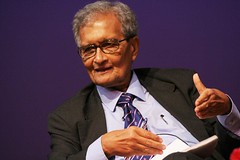INDIA
28 March 2014
Amartya Sen on development on Youtube
Amartya Sen explains his views on development in a couple of film clips. They are very much worth watching.
Amartya Sen explains his views on development in a couple of film clips. They are very much worth watching.
In the first short film clip, Nobel prize-winning economist Amartya Sen explains his conception of "development as freedom". For Sen, development is all about the expansion of human freedoms, about people gaining freedom to control their lives. This means removing the "deprivations" that plague human lives, or in other terms removing "unfreedoms" -- these deprivations or unfreedoms can be economic, social, environmental and political in nature.
The key to removing these deprivations is developing people's "capabilities". People must be "enabled" or "empowered" to take charge of their lives.
In this second film clip Sen emphasises the role of institutions in development. Capacity is all about helping people become free to lead their lives, and institutions can play an important role in this regard. In particular: (i) democracy is an important institution which allows policy to be determined by a plurality of views; (ii) media can expose both the good things and bad things in our society; (iii) flourishing markets are necessary, but in some instances, must be restrained. (iv) we must also have redress against markets, when things go wrong -- in this context, freedom of information is necessary; (v) the legal system should provide people with legal rights, and protect minority groups, women, etc.
A key point is having a multiplicity of institutions. In the US, there has been too much focus on one institution, namely the market, since the times of Reagen. We have seen the demolition of the checks and balances that the state can provide. One of the underlying causes of the global financial crisis was the denial of the need for a plurality of institutions.
As Adam Smith recognized, markets can fail and we need an intelligent state and public scrutiny and reasoning.
And to finish on a lighter note, we include a colorful take on development by SarahJoy Pond.
Executive Director
Asian Century Institute
www.asiancenturyinstitute.com
In the first short film clip, Nobel prize-winning economist Amartya Sen explains his conception of "development as freedom". For Sen, development is all about the expansion of human freedoms, about people gaining freedom to control their lives. This means removing the "deprivations" that plague human lives, or in other terms removing "unfreedoms" -- these deprivations or unfreedoms can be economic, social, environmental and political in nature.
The key to removing these deprivations is developing people's "capabilities". People must be "enabled" or "empowered" to take charge of their lives.
In this second film clip Sen emphasises the role of institutions in development. Capacity is all about helping people become free to lead their lives, and institutions can play an important role in this regard. In particular: (i) democracy is an important institution which allows policy to be determined by a plurality of views; (ii) media can expose both the good things and bad things in our society; (iii) flourishing markets are necessary, but in some instances, must be restrained. (iv) we must also have redress against markets, when things go wrong -- in this context, freedom of information is necessary; (v) the legal system should provide people with legal rights, and protect minority groups, women, etc.
A key point is having a multiplicity of institutions. In the US, there has been too much focus on one institution, namely the market, since the times of Reagen. We have seen the demolition of the checks and balances that the state can provide. One of the underlying causes of the global financial crisis was the denial of the need for a plurality of institutions.
As Adam Smith recognized, markets can fail and we need an intelligent state and public scrutiny and reasoning.
And to finish on a lighter note, we include a colorful take on development by SarahJoy Pond.
Author
John WestExecutive Director
Asian Century Institute
www.asiancenturyinstitute.com




